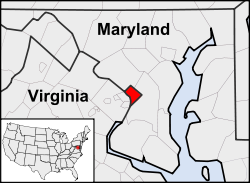Top Qs
Timeline
Chat
Perspective
United States presidential elections in the District of Columbia
From Wikipedia, the free encyclopedia
Remove ads
Since the enactment of the 23rd amendment to the Constitution in 1961,[1] the District of Columbia has participated in 16 presidential elections. The amendment states that it cannot have any more electoral votes than the state with the smallest number of electors.[2] Since then, it has been allocated three electoral votes in every presidential election.[3] The Democratic Party has immense political strength in the district. In each of the 16 presidential elections, the district has overwhelmingly voted for the Democratic candidate, with no margin less than 56.5 percentage points. It has been won by the losing candidate in 9 of the 16 elections. In 2016, Donald Trump, the Republican candidate who would win the election eventually, received less total votes in the District than the third-party candidates combined.
In the 2000 presidential election, Barbara Lett-Simmons, an elector from the district, left her ballot blank to protest its lack of voting representation in Congress. As a result, Al Gore received only two of the three electoral votes from Washington, D.C.[4] In 2016, 85.7% of the registered voters approved a statehood referendum.[5] In recent times, there have been various statehood movements in the District of Columbia, which advocates making the district a state.[6][7]
The district is a signatory of the National Popular Vote Interstate Compact, an interstate compact in which signatories award all of their electoral votes to the winner of the national-level popular vote in a presidential election, even if another candidate won an individual signatory's popular vote. As of 2025, it has not yet gone into force.[8]
Remove ads
Presidential elections
Graph
The following graph shows the margin of victory of the Democratic Party over the Republican Party in the 15 presidential elections the District of Columbia participated.
This graph was using the legacy Graph extension, which is no longer supported. It needs to be converted to the new Chart extension. |
Remove ads
See also
Notes
- For purposes of these lists, the "other candidate" is defined as the person who received the third-most votes in the District of Columbia. The total votes across the winner, runner-up, and "other candidate" do not equal the total votes cast in each election because any votes for remaining candidates and write-ins are not counted here.
- Abstention from one elector[33]
References
Works cited
Wikiwand - on
Seamless Wikipedia browsing. On steroids.
Remove ads

